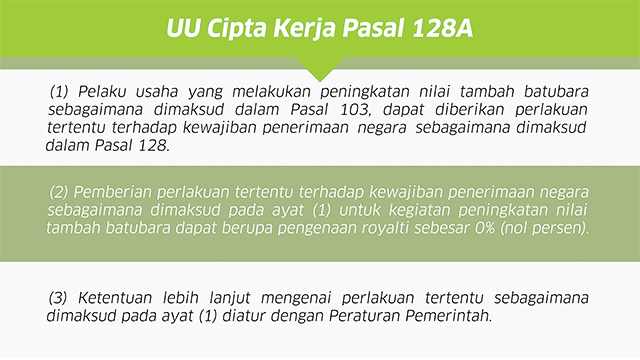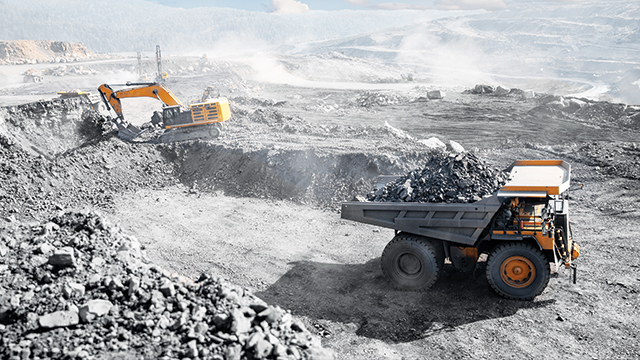Jakarta (Greeners) – After the government and DPR RI gave mining entrepreneurs a red carpet through the revision of the Minerba (Minerals and Coal) Law, now in the Job Creation Law, the government is selling out Indonesia’s natural resources for free through 0 (zero) percent royalty.
Aryanto Nugroho, National Coordinator of Publish What You Pay (PWYP) Indonesia, explains the purpose of the 0 percent royalty. He clarifies there are two obligations of coal entrepreneurs regarding state revenue: royalties and taxes. Royalty is non-tax state revenue (PNBP) imposed at a specific rate for a certain calorie level.
“The zero percent royalty is given to coal entrepreneurs who increase their added value. In our opinion, this is a form of excessive incentives for coal entrepreneurs. Previously coal entrepreneurs have also been given many incentives in the new Minerba Law,” says Nugroho to Greeners Friday (09/10/2020).
The added value of coal, Nugroho defines, including coal development; coal upgrading; coal briquetting; coking; coal liquefaction; coal gasification including underground coal gasification; and a coal-water mixture (coal slurry / coal-water mixture). It includes the use of coal by building its own Steam Power Plant (PLTU) at the mine’s mouth.
“If PNBP claim royalties, it means that later it will be distributed to the regions into Profit Sharing Funds (DBH). Meanwhile, if the royalty is 0 percent per the Omnibus Law on Job Creation, this DBH for the regions will run out,” he argues.

Aryanto Nugroho, the National Coordinator for Publish What You Pay, assesses the 0 percent royalty as an excessive incentive for coal entrepreneurs. Data Source: Job Creation Law (1,052 pages version) / Graphic Designer: Order Dipo.
Also read: Motion of No Confidence, Indonesian People’s Faction Demands DPR to Cancel the Omnibus Law
NGO: Zero Percent Royalty, the Job Creation Law is Giving Away Coal
Auriga Nusantara Mining Researcher Iqbal Damanik says that the provision of 0 percent royalties is the same as giving coal free of charge to coal entrepreneurs, betraying the 1945 Constitution’s mandate.
Damanik adds that this incentive would encourage the rate of massive exploitation along with the destruction of living space and an uninhabitable environment. This situation is contrary to the Indonesian government’s intention to limit coal production, as outlined in the National Medium-Term Development Plan (RPJMN).

Iqbal Damanik, Auriga Nusantara Mining Researcher, says that this incentive will drive a massive exploitation rate that goes hand in hand with the destruction of living space and an uninhabitable environment. Photo: Shutterstock.
Since last year, he continues, many large coal companies had experienced financial difficulties even before the pandemic. These coal companies have debts that due in 2020, 2021, and 2022. Damanik mentions Moody’s Investor Services that reveals these companies’ total debt reaches USD 2.9 billion or around IDR 42 trillion, which will due in 2022 alone. These debts are in the form of bank credit and bonds.
Also read: Experts: Job Creation Law Weakens Environmental Protection Efforts
NGO: Our Country Would Lose Trillions of Rupiah
On the other hand, Damanik continues, through the Job Creation Law, Government is giving an up to 100 percent discount for companies to deposit royalties. It means that royalties’ relaxation will cause the country to lose potential revenue of up to USD 1.1 billion and USD 1.2 billion from taxes collected in 2019 from 11 coal companies.
“All this happens because the legislation on the Job Creation Law has been held hostage in a conflict of interest, the political and business oligarchic actors in the parliament have mixed up. As many as 50 percent of the DPR members and their leaders are also connected to the coal business. Even the Omnibus Law Task Force also contains commissioners and directors of coal companies. They will also benefit from the Job Creation Law policy itself,” says Merah Johansyah, Coordinator National Mining Advocacy Network (Jatam), which is also the spokesperson for #BersihkanIndonesia.
Johansyah says the royalty discount of up to 100 percent would benefit mining companies. By eliminating coal’s royalty for the sake of saving entrepreneurs, state, and regional revenues that have been dependent on coal will drop dramatically.
“At the same time, exploitation continues to occur in the regions. This regulation will also trigger the expansion of damage and environmental pollution. For example, mining pits and expulsion of people from their land. The cost of recovery is gone, and there are no funds because mining companies are given royalty discounts,” adds Johansyah.
Reporter: Dewi Purningsih
Editor: Ixora Devi



















































